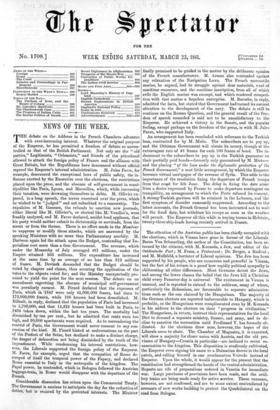NEWS OF THE WEEK.
MHE debate on the Address in the French Chambers advances
with ever-increasing interest. Whatever the original purpose of the Emperor, he has permitted a freedom of debate as uncon- trolled as that of the British Parliament. Not only are the "old parties," Legitimists, " Orleanists," and friends of the priesthood allowed to attack the foreign policy of France and the alliance with Great Britain, but the Republicans have denounced without official reproof the Emperor's internal administration. M. Jules Favre, for example, denounced the exceptional laws of public safety, the in- fluence exerted by the Executive over the elections, the restrictions placed upon the press, and the absence of self-government in muni-- dpalities like Paris, Lyons, and Marseilles, which, while increasing their taxation, were drowning themselves in debts. M. 011ivier ex- posed, in a long speech, the terror exercised over the press, which he wished to be "judged" and not submitted to a censorship. The expulsion of M. Ganesco, the refusals to sanction new journals, either liberal like M. 011ivier's, or clerical like M. Veuillot's, were frankly analyzed, and M. Favre declared, amidst loud applause, that his party would neither submit to dictatorship or servitude, from the street or from the throne. There is no effort made in the Moniteur to suppress or modify these attacks, which are answered by the speaking Ministers with no more than Parliamentary acerbity. M. Darimon again led the attack upon the Budget, contending that Im- perialism cost more than a free Government. The revenue, which under the Monarchy of July averaged 481 millions, under the Empire attained 503 millions. The expenditure has increased at the same time by an average of no less than 312 millions of francs. M. Devinck demanded that the Budget should be voted by chapter and clause, thus securing the application of the votes to the objects voted for; and the Ministry unexpectedly pro- mised to yield the point for the next session. The debate on an amendment regretting the absence of municipal self-government was peculiarly earnest. M. Picard declared that the expenses of Paris, which in -1847 were only 45,000,000 francs, had risen to 172,000,000 francs, while 106 houses had been demolished. M. Billault, in reply, declared that the population of Paris had increased to 1,700,000, and that 15,3'25 houses had been built in Paris, to ,2494 taken down, within the last ten years. The mortality had diminished by ten per cent., but he admitted that rents were too high, and 20,000 apartments were required. As to surrendering the control of Paris, the Government would never consent to any con- cession of the kind. M. Picard hinted at malversations on the part of the Prefect of the Seine, but declined to make a distinct charge, the danger of defamation not being diminished by the truth of the impeachment. While condemning his internal restrictions, how- ever, the Liberals supported the foreign policy of the Emperor. M. Favre, for example, urged that the occupation of Rome de- stroyed of itself the temporal power of the Papacy, and declared Rome essential to Italy as the metropolis of the kingdom. The Papal power, he contended, which in Bologna followed the Austrian baggage-train, in Rome would disappear with the departure of the French.
Considerable dismission has arisen upon the Commercial Treaty. The Government is anxious to anticipate the day for the reduction of duties, but is resisted by the protected interests. The Minister finally promised to be guided in the matter by the deliberate opinion of the French manufacturers. M. Arman also contended against any relaxation of the Navigation Laws. The French mercantile marine, he argued, had to struggle against dear materials, want of maritime resources, and the maritime inscription, from all of which evils the English marine was exempt, and which rendered competi- tion with that marine a hopeless enterprise. M. Baroche, in reply, admitted the facts, but stated that Government had turned its earnest attention to the development of the navy. The debate is still to continue on the Roman Question, and the general result of the free- dom of speech conceded is said not to be unsatisfactory to the Emperor. He achieved a victory in the Senate, and the popular feeling, except perhaps on the freedom of the press, is with M. Jules Favre, who supported Italy.
An arrangement has been concluded with reference to the Turkish loan, contracted for by M. Mires. The subscribers are to pay up, and the Ottoman Government will obtain its money, though at the extravagant rate of 48 francs for each 100 francs of bond. The in- ducement to the subscribers to pay up is the Turkish guarantee on their partially paid bonds—formerly only guaranteed by M. Mires— and the placing "of' the loan under the diplomatic protection of the French Government," a neat little arrangement, by which the Emperor becomes virtual 'mortgagee of the revenue of Syria. This adds to the importance of the resolution fixing the departure of French' troops from that coat for 5th June. The delay in fixing the date arose from a desire expressed by France to make departure contingent on tranquillity, an arrangement to which the Porte refused its consent. A strong-Turkish garrison will be retained in the Lebanon, and "the, first symptom, of disorder summarily suppressed. According to the latest accounts, the French General has been instructed not to wait for the fixed date, but withdraw his troops as soon as the weather will permit. The Emperor all this while is buying horses in Holstein,. _ twenty-three ship-loads having recently arrived in France.






























